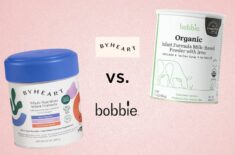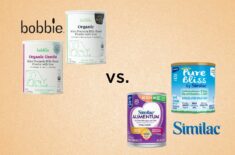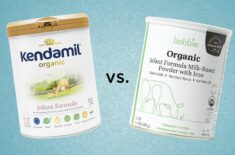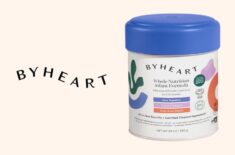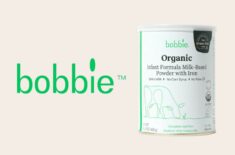Study: Toddler Formulas Are Unregulated & Can Be ‘Unnecessary’
US Kids Can Get Adequate Micronutrients From Diet
A 2023 Public Health Nutrition Journal clinical report from the AAP (American Academy of Pediatrics) claims that toddler formulas are ‘unnecessary.’ The study explains that most of the young children in the US have diets that are “generally adequate for most micronutrients.” (1)
The AAP recommends exclusive breastfeeding until around 6 months of age. When ready or around 6 months old, you can introduce your baby to solid foods. (1)(2)
As part of a nutritionally complete and balanced diet, the AAP also recommends whole cow milk beginning at 12 months of age for infants who aren’t breastfed. (1)
Does that mean that toddler formulas, often more expensive than cow’s milk, are just a waste of money?
A 2019 Journal of Nutrition study showed that the average energy and nutrient intakes of US children up to 4 years of age are generally adequate. While nutrient gaps can still exist, particularly in fiber, iron, and vitamins D and E, these children are likely still receiving enough to fuel their growth and development. (1)(3)
The findings of the 2019 study also led the 2023 study authors to conclude that toddler formulas are unnecessary because kids can get their nutrient needs from food. (1)(3)
Too Many Formula Names Can Lead To Confusion
Currently, toddler formulas are being promoted under different ‘identities,’ which might lead to confusion on what’s appropriate for children of different ages (see table below). (1)

No Specific Regulations For Toddler Formulas
Unlike strictly regulated infant formulas, the US doesn’t have a distinct category and regulation for toddler formulas. (1)
According to the study, these toddler formulas might have components that are either inadequate or ‘unnecessary’ because the regulations have only focused on what infants need. For example, their protein content might be lower or higher than what toddlers require. (1)
Toddler Formulas Can Have ‘Harmful’ Content
Some toddler formula components (e.g., added sweeteners or higher sodium content) might harm children’s health. (1)(4)
OIYCFs (older infant-young child formulas) might be considered sugar-sweetened drinks. So, consuming these products might also affect taste preference, leading to possibly higher intake of other sweetened beverages. (1)
This is alarming because studies have shown that sugar can be more addictive than cocaine. There’s this thing called ‘sugar addiction,’ which can be dangerous because high sugar consumption can lead to the following: (5)(6)(7)
- Emotional disorders, including anxiety and depression
- Cognitive or learning impairments
- Negative neuroplasticity (akin to exposing the brain to trauma or stress)
Toddler Formulas Can Be ‘Inadequate’ (Especially For Kids With Special Nutrition Needs)
The study also points out that these OIYCFs “are not nutritionally complete.” Since they’re designed to replace human milk or the AAP-recommended whole cow milk for healthy, normally growing children, they can be inappropriate for children who need medical nutritional therapy, such as those: (1)
- with swallowing dysfunction or similar medical issues
- in states of growth faltering or deprivation due to malnutrition or the medical term “failure to thrive” (kids who failed to grow and develop normally)
- with feeding aversions (refusal to feed, indicated by turning their head away or gagging)
- with medical conditions such as cerebral palsy, celiac disease, inborn metabolism errors, gastrointestinal disorders, food intolerance, or allergies
- with other situations that make them rely solely on formulas for a major proportion of their diet or nutritional intake
The Negatives Can Outweigh The Positives
The 2023 study concedes that toddler formulas can also have benefits for children. (1)
For example, the researchers cited clinical trials showing that growing-up milk or micronutrient-fortified young-child formulas can help improve children’s vitamin D and iron levels. (1)(8)(9)
Indeed, the 2023 study authors explained that toddler formulas with “appropriate composition and context” can support children’s health and provide them with the key nutrients they need for growth and development. (1)
However, children can also get adequate iron and vitamin D from food or supplements. So, the researchers concluded: (1)
“…the sum total of attributes of OIYCFs, including those that are undesirable in some, as described earlier, make them unnecessary for most; therefore, emphasis should be on consumer education, nutritionally balanced diets, consumption of fortified foods, and food security to ensure dietary adequacy.”
Toddler Formulas Are More Expensive Than Cow’s Milk
Because toddler formulas generally cost more than cow’s milk, they can be an added burden to families. In contrast, cow’s milk costs less and is still recommended by the AAP for children older than one year. (1)(2)
Are Toddler Formulas Necessary?
Unlike infant formulas, which can be the sole nutrition source for babies who are still too young to eat, toddler formulas aren’t considered necessary by the authors of the AAP study discussed above. (1)
However, it is important to know that the right toddler formula can provide your children with the nutrients they need for growth and development, without requiring additional supplementation. (1)
Not all toddler formulas are created equal.
Motherhood Community recommends Serenity Kids Toddler Formula (read up on our interview with the founders about this formula here).
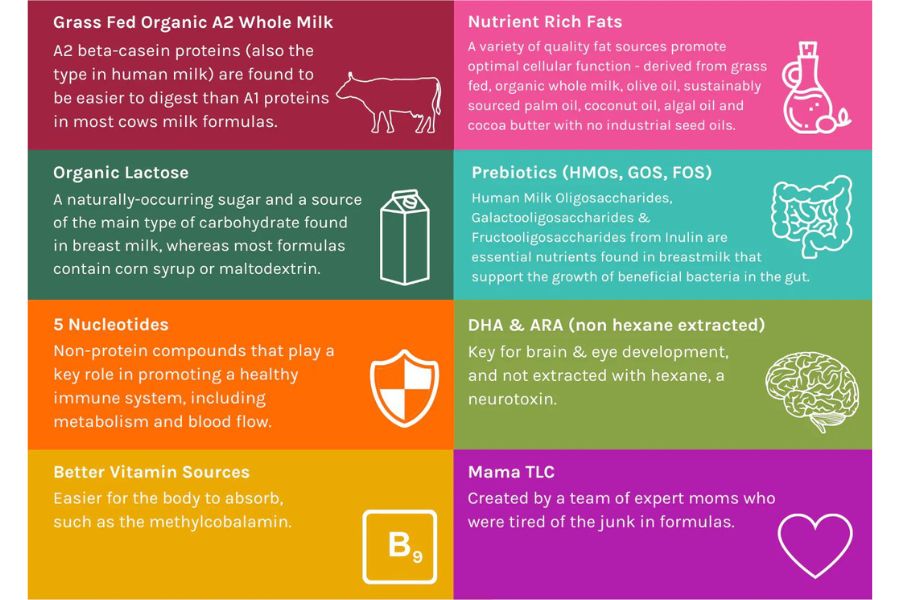
Serenity Kids Toddler Formula is packed with vitamins, nutrients, and minerals that kids need for proper development, such as:
- Nucleotides (can help in gut repair and is important in immune responses or growth) (10)
- Prebiotics for a healthier gut: HMOs (human milk oligosaccharides), GOS (galacto-oligosaccharides), and FOS (fructooligosaccharides) (18)
- Nutrient-rich fats (can promote brain health, help in the absorption of fat-soluble vitamins such as A and D, and are the building blocks of hormones) (19)
This toddler formula is free from ingredients that can be harmful to young children, including the following:
- Soy (can cause stomach upset, nausea, diarrhea, or vomiting; some might also experience bloating, gas, or constipation) (11)(12)
- Corn and rice syrup (increase appetite and promote obesity) (13)
- Synthetic folic acid (some people who have methylenetetrahydrofolate reductase or MTHFR genetic mutation might have difficulty in processing this, so folate is used in Serenity Kids toddler formula) (14)
- Industrial seed oils (these might have large amounts of unstable fatty acids which can turn into toxins when they break down) (15)
- GMOs or genetically modified organisms (California-based pediatrician Dr. Michelle Perro explained that GMOs can cause autoimmunity, allergies, neurological disorders, ADHD or attention deficit hyperactivity disorder, autism, endocrine disruption, and growth failure) (16)
- Gluten (can cause diarrhea, bloating, skin rashes, or headaches in children with gluten allergies and/or celiac disease) (17)
This clean and healthy product is also made from grass-fed organic A2 whole milk, which can help ease the symptoms of lactose intolerance. (20)
Serenity Kids’ founders also take pride in offering a formula made of an easy-to-digest recipe that can be ideal for sensitive tummies.
Here’s a comparison of how this toddler formula stacks up with other brands:
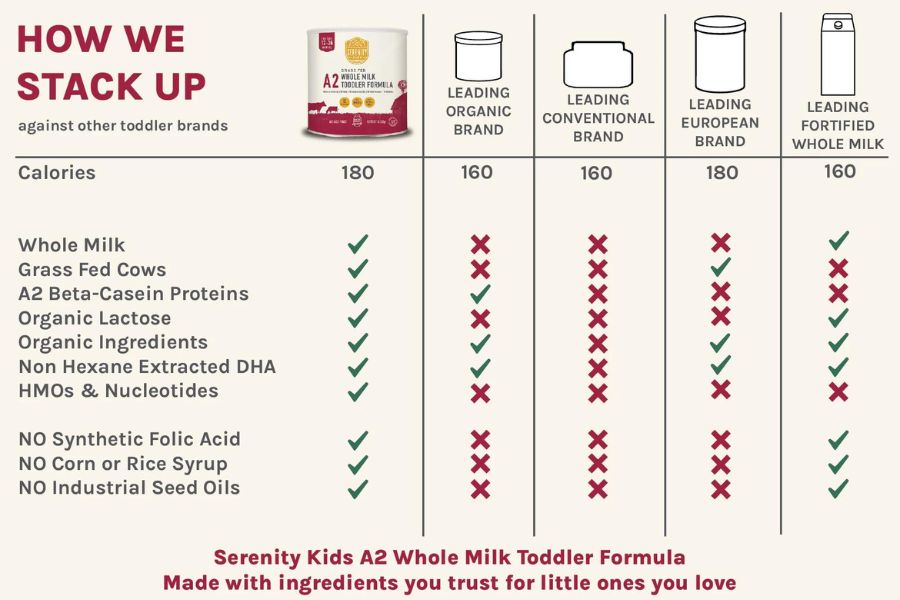
(Use our code MHC for 15% off first-time orders, too! )
Do Doctors Recommend Toddler Formula?
George J. Fuchs, III, MD, FAAP, the lead author of the 2023 study above and a member of the AAP Committee on Nutrition, explains: (21)
“Products that are advertised as ‘follow-up formulas,’ ‘weaning formulas,’ or ‘toddler milks and formulas,’ are misleadingly promoted as a necessary part of a healthy child’s diet or, for those directed at young infants, equivalent to infant formula.”
“These drinks should not replace a balanced diet and are inferior to standard infant formula in children less than 12 months of age and offer no benefit over much less expensive cow’s milk in most children older than age 12 months.”
“Some children may have special nutritional needs, as well, and so as with any child, it is always best to check with your pediatrician.”
The AAP (an association of pediatricians) explains that most kids don’t need toddler formula. However, every child is different, and kids can also have varied diets or health situations.
As Dr. Fuchs pointed out, it’s best to talk to your pediatrician about toddler formulas because they’re the ones who know best about your little one’s nutrition needs and requirements.
FAQs
Is 2 Years Old Too Old For Formula?
Possibly, yes. In general, children can be weaned off of formula when they’re around one year of age. (1)
They can begin taking cow’s milk when they’re at least 9 months old. (2)
However, if your child is a picky eater who isn’t getting adequate nutrition from food, talk to your pediatrician about whether they need to continue taking formula, switch to toddler formula, or have supplements instead.
Should A 3-Year-Old Still Be On Formula?
No, unless your child has special dietary restrictions or medical conditions that require specialized formulas.
References
(1) https://publications.aap.org/pediatrics/article/152/5/e2023064050/194469/Older-Infant-Young-Child-Formulas?autologincheck=redirected
(2) https://www.aapdc.org/infant-formula-updates/
(3) https://www.ncbi.nlm.nih.gov/pmc/articles/PMC6602894/
(4) https://healthyeatingresearch.org/wp-content/uploads/2019/09/HER-HealthyBeverage-ConsensusStatement.pdf
(5) https://pubmed.ncbi.nlm.nih.gov/28835408/
(6) https://www.ncbi.nlm.nih.gov/pmc/articles/PMC2235907/
(7) https://www.sciencedirect.com/science/article/pii/S0149763418308613?via%3Dihub
(8) https://pubmed.ncbi.nlm.nih.gov/30281106/
(9) https://pubmed.ncbi.nlm.nih.gov/28052885/
(10) https://pubmed.ncbi.nlm.nih.gov/12410863/
(11) https://www.hsph.harvard.edu/nutritionsource/anti-nutrients/lectins/
(12) https://www.nccih.nih.gov/health/soy
(13) https://health.clevelandclinic.org/avoid-the-hidden-dangers-of-high-fructose-corn-syrup-video/
(14) https://www.marchofdimes.org/find-support/blog/mthfr-variant-and-folic-acid-what-you-need-to-know
(15) https://drcate.com/seed-oils-questions-answers-for-your-health/
(16) https://www.greenamerica.org/blog/downsides-gmo-infant-formula-we-asked-pediatrician
(17) https://www.hopkinsmedicine.org/health/wellness-and-prevention/what-is-gluten-and-what-does-it-do
(18) https://link.springer.com/article/10.1007/s00253-021-11646-8
(19) https://kidshealth.org/en/parents/fat.html
(20) https://www.ncbi.nlm.nih.gov/pmc/articles/PMC4818854/
(21) https://www.healthychildren.org/English/news/Pages/why-most-toddlers-dont-need-toddler-formula.aspx




